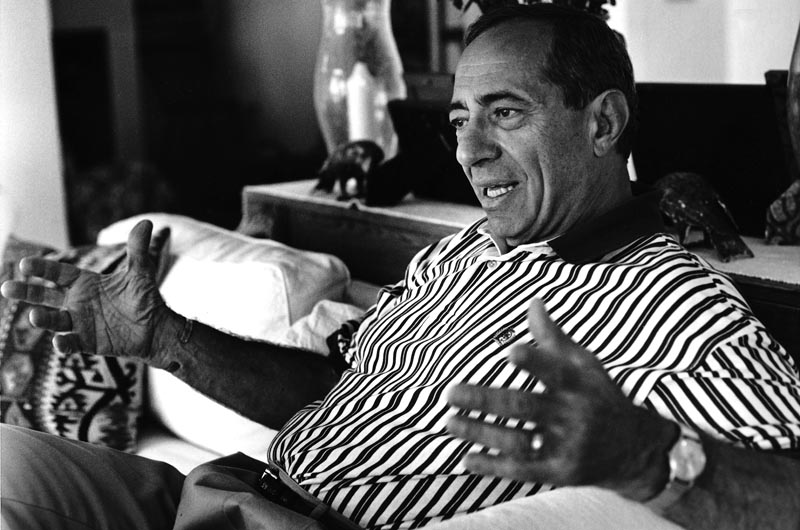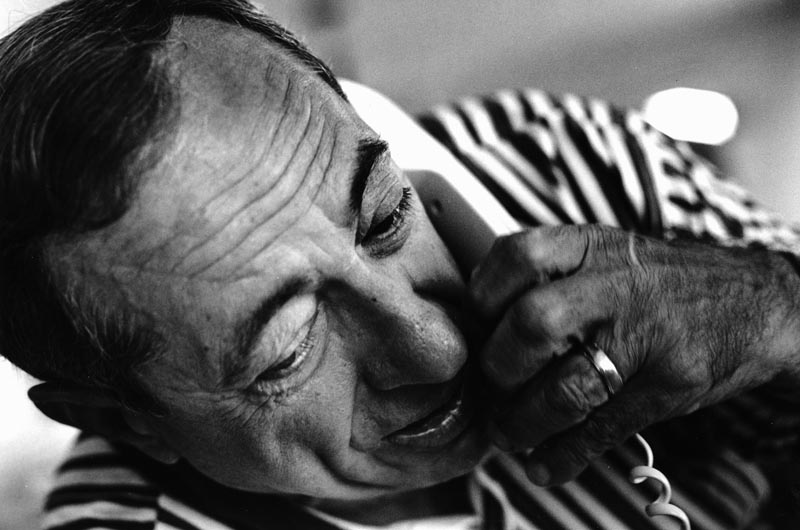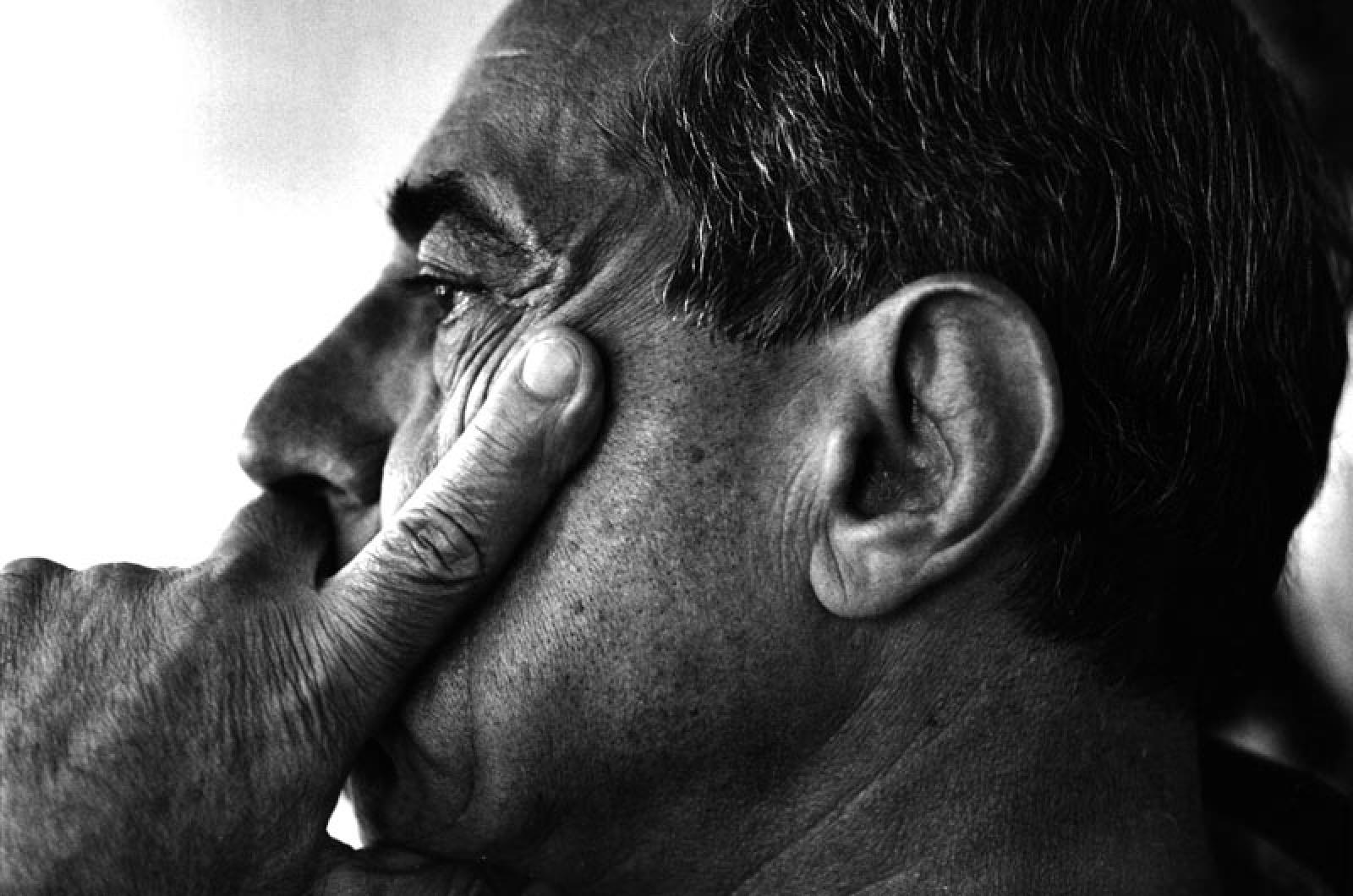Editor's Note: In July 1997, Mario Cuomo took time out of a Vineyard vacation for a wide-ranging interview with the Gazette. Mr. Cuomo, a three-term governor of New York, died Thursday at age 82. According to the New York Times, the cause was heart failure.
It is the morning of July Fourth, the birthday of American independence and a dazzling summer day on the Vineyard. Mario Cuomo is seated on a couch in the summer home owned by his daughter and son in law, surrounded by a cabal of Cuomos who are in various stages of coming and going on this national holiday. In a few minutes he will submit to an interview with a newspaper reporter and he is characteristically primed, full of his own questions about the Island, ready to be plumbed for the umpteenth time on a political ideology which is both capacious and profound, even to the most hardened cynic.
But first things first. Right now, two young granddaughters are seated next to him on the couch and the former governor of New York is in the middle of a serious homily on tickling. “You see, this is about integrity and also focus,” he says, straight faced, one hand moving slowly toward the underside of the young child’s chin. “Focus, that’s right, don’t think about it, put yourself in another place.” The first child manages to survive with only a slight shudder, but the second does not fare as well, collapsing in a heap of giggles before the dreaded tickle even begins.
For the last several days this house on the Vineyard has been the happy scene of a Cuomo family reunion, the first time in 20 years that the entire family has been in one place at one time, outside of the governor’s mansion in New York.
There has been plenty of swimming and fishing and boating — and of course tickling — and the atmosphere has the relaxed, unwound quality of a large extended family at peace with itself.

The patriarch of this clan is Governor Cuomo, and today his conversation strays seamlessly across an array of subjects — his family, his passions, his thoughts about the country on this day that celebrates the birth of American independence.
But at the outset his newfound fascination is with Martha’s Vineyard, a place he has only visited once before, briefly, two years ago for a late summer fund raiser. He fires a litany of questions at his visitor: What is the political structure, who is in charge of conservation, who forms the middle class, and finally the best question, the one that instantly endears him to Islanders of every class.
“I am eager and curious about what this place is like in the winter. What does it look like? Does ice form on the water out there?” he says. “I found a book here in the house that helps me understand this place a great deal. It was inspiring.” He is talking about Rose Styron’s book of poetry, By Vineyard Light, with photographs by Craig Dripps.
Mr. Cuomo seizes instantly on the challenge and the inherent contradictions of the Vineyard. It is obvious to him that the Island is a clear example of what he frames as the eternal political conflict between development and conservation.
“You must try to keep the habitat the way it is, the challenge is how do you do that,” he says. “People have a tendency to polarize the discussion and the key is to not polarize it but to take the natural beauty and figure out how you make it compatible with a reasonable economic benefit. But the greatest economic benefit is the habitat. This is a good place to live because of its natural beauty.”
For the Cuomo family, the Vineyard is a perfect fit. Daughter Maria and her husband Kenneth Cole have been coming for a number of years, and this year they bought a house. It was Maria and Ken and the other kids who organized the family gathering; the Cuomos have five children and seven grandchildren.
“Our family is an unusual family. We are all mature now, and we all grew up together,” says Mr. Cuomo, who was elected as New York State’s 52nd governor in 1982 and served for three consecutive terms. He is widely known for his leadership, his socially progressive agenda, his depth and his eloquence.
Among his countless accomplishments, he launched the largest economic development plan in the history of the state, balanced 12 consecutive budgets, created the largest homeless housing assistance program in the history of state and a nationally recognized program to deal with AIDS. He launched the nation’s first real alternative to welfare and a revolutionary 10-year commitment to New York children called The Decade of the Child.
Looking back on it all today, he says only that he was an unlikely candidate.
“My becoming a governor and being governor for three terms was a spectacular absurdity,” he says. “My mother and father couldn’t read or write a word of English. I was born behind a grocery store and raised in a room with a divided curtain of beads — like gypsies.
“Elegance and wealth did not come naturally to us and there may be something useful about that. I grew up in a situation where my parents had to struggle very very hard just to survive, and there is something very good for you being around that kind of existence. My own children grew up being part of a middle class, and that is of course what most of this country is — not most of the world, most of the world is in fact very poor, but these kids grew up in a middle class and received the benefits from it. In terms of Martha’s Vineyard and what kind of place you choose to live — the simple kinds of pleasures of this place are the kinds that appeal to the members of this family.”
Today, at 65, the former governor practices law at the New York city firm of Wilkie Farr & Gallagher, and travels around the country lecturing. His own version: “I am watching my children, playing with my grandchildren, thinking about the country and debating people like Quayle and Sununu — just for fun.” He admits to having national ambitions, although he does not elaborate, and he says the real person in the family to watch politically is son Andrew, currently Secretary of Housing and Urban Development (HUD) in President Clinton’s cabinet.
Andrew has just left to take two pint-sized girls out on a boat.
And how does the governor unwind?
“I am a bore, they made great fun of me as a governor — the whole press corps did — the press said, ‘This guy went to Tokyo on the red-eye so he could sleep in his own bed,’” he says, smiling at the memory. “And it’s true — but the real truth is that I wasn’t interested in the parties and the receptions, I was the governor and I wanted to be back at my desk working.”
He thinks about the question some more.

“I think I read more than most people, and because of my profession I read a lot of really heavy, technical stuff, but given my druthers I think I would read a lot of poetry.
“I like reading about different religions because if you read enough about religions they all come out at the same place. To me the political issue that comes closest to being religious is the environment and conservation. Because you willingly give up and sacrifice things of value to yourself to preserve things for unborn children you will never know.”
And now he remembers, he loves to play basketball. Yesterday he discovered the courts at Veteran’s Memorial Park in Vineyard Haven. “To me the ultimate vacation would be basketball,” he says. “As long as you are on that court you are engaged and consumed by the effort. I hope I die making a left hook shot, you know, just as the ball goes through the net and the scoreboard lights up 62-61. Then put me in the coffin with my sneakers on.”
In fact, team sports are a distinct metaphor for Mario Cuomo’s political doctrine.
“Basketball, like baseball, and more than tennis and more than golf — you have to play it as part of a team, and the essential element of it is you strengthen the whole. And that is the secret to all governance,” he says.
But beyond family, beyond basketball, beyond this genuine enchantment with the Vineyard, another conspicuous question hangs in the air during this Fourth of July conversation. What of the country and its direction as the millennium approaches? The question stirs his deepest thoughts, and the trademark Cuomo eloquence pours out.
“The Declaration of Independence was a birth of American society that capitalized on individual strengths — not so much communal but individual — and for over a hundred years we lived that way. The pioneers were of course the example; I think John Wayne was recently described as the icon of America because of his rugged individualism.
“Then we learned about 70 years ago that in this new industrialized, highly developed society, that there was a new interconnectedness. . . Now we needed to develop a different approach to this individuality and that is what Roosevelt was all about. Out of the Depression we invented Workers Compensation and Medicare and welfare for people who could not work. Those ideas over the 70 years have made us the strongest nation in history and you could not have been there without that sense of interconnectedness.”
He continues:
“Where has it taken us? This economy is very strong, and if you are a significant investor that is a good thing. This economy is good for the top five per cent of the American people, but the middle class is stagnant and forget about the poor.
“At the moment, we are stronger than anyone in the world, but we are nowhere near as strong as we could be. We still need to find ways to strengthen the middle class and give the poor more opportunities. And that is the challenge of the year 2000. There is this sense in the country right now that this is as good is it gets — don’t talk about the middle class and the poor, because you’ll spoil it — and I reject that.
“I think the most cogent characterization about where we are as a people was delivered in that movie The Graduate — what year did that come out? — Remember how the song went, ‘Where have you gone Joe DiMaggio, the nation turns its lonely eyes to you. . . .’ DiMaggio is gone, Kennedy was killed, King killed, no heroes left, Vietnam adds to it, no great cause to unite us and uplift us. There is no religion, nothing left but individualism and the emptiness that produces. It is now a time of immense success, immense activity and immense emptiness.
“And that gets back to Martha’s Vineyard and what you have here. You can see it all here in one day, right here in this room, stay up long enough to see the sun go down over the pond, watch it turn into a glowing red ball and see all the changes in the light that come with it. Then stay up all night and don’t even change your seat and watch it come up over there on the other side of the pond. Think hard enough and you will understand.”





Comments (3)
Comments
Comment policy »